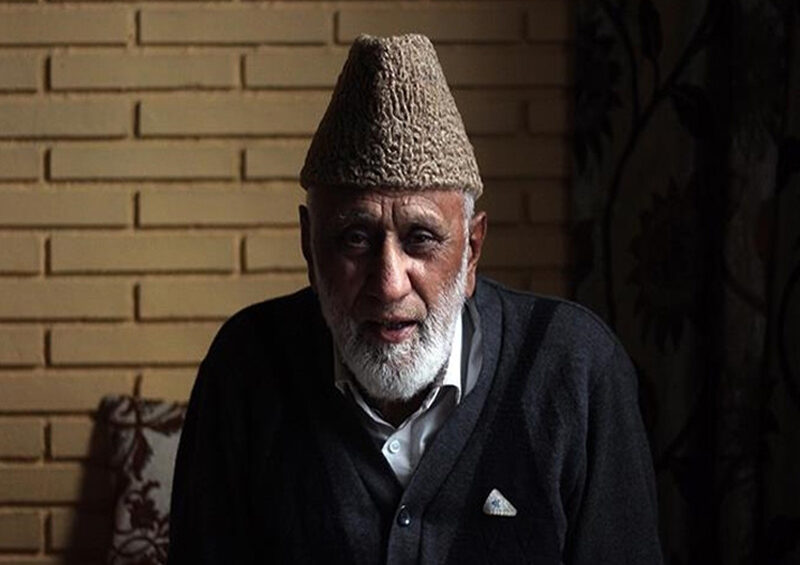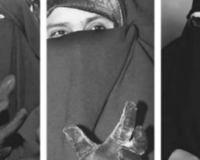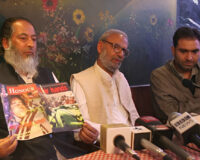A man of uncompromising nature, Shaheed Sehrai was known to be a close confidant of late Syed Ali Shah Geelani, the most popular resistance figure of the disputed region of Jammu and Kashmir who passed away in September last year. Both remained close to each other for almost 50 years. First arrested when he was 22 years of age, Sehrai spent above 16 years in different jails of India but never distanced himself from the movement of Kashmir’s right to self-determination. His son, Junaid Sehrai, a top commander of Kashmir’s largest indigenous armed group Hizbul Mujahedeen was martyred in 2020.
It was in late 1980’s that a wagon stopped outside the residence of Sehrai Sahab in Lolab and three men came inside searching for him. After serving them tea, Sehrai Sahab was asked to bring some large tote bag that laid inside the car. When asked what exactly was inside the bag, one among the men replied that the bag was full of money, enough for a man to settle anywhere and live a lavish life. Sehrai was shocked. The men were there for a deal. Sehrai Sahab could keep the bag and stop actively talking about what was going around and disassociate himself from a movement that was yet in its early stage. He unequivocally refused their offer and some close associates of Sehrai Sahab still remember him saying, “ Sehrai kisi bhi miqdaar ki dowlat sy Khareeda nahi ja sakta”(Sehrai cannot be bought with any amount). The men who were from IB ( Intelligence Bureau of India) were surprised to see the resilience of the man. The man in his later years sold his land in Lolab to survive and take a leading role in the fight against Indian rule. This was not the only time Sehrai Sahab was offered huge money and other incentives to remain silent.
After Syed Ali Shah Geelani disassociated himself from Jamaat Islami and formed Tehreek-e-Hurriyat of which Sehrai Sahab was made chairman, a high profile team of Research and Analysis wing (RAW) visited his Hyderpora residence and offered him huge money in return of his silence and abstention from resistance against Indian occupation but again Sehrai Sahab refused to compromise. Later during the crucial period of Civilian Agitation against Indian rule, Sehrai Sahab was again offered two government jobs for Junaid and Mujahid, his two sons, one currently in jail, only if he could denounce people’s actions and appeal them to stop coming out on streets. But again, the commitment of Sehrai for his people and the resolution of Kashmir led him to not only refuse to make any kind of compromise but also shame the men who came with such offers.
He was arrested in 2019 during a widespread crackdown on resistance leadership and was shifted to jail in 2020. Family members of Sehrai sahib say that he was deliberately denied any medical treatment despite developing some serious health issues. “We would send him medicines every month from home. We had also filed a medical petition in court and appealed that he be allowed to get the medical treatment, but to no avail” Mujahid Said while discussing how the Indian authorities were making a situation inside jail where it would become impossible for him to survive. Lodged inside Udhampur Jail, 200 kilometres away from his home, Sehrai sahib’s health deteriorated and was shifted to a Jammu hospital only when it became evident to jail authorities that he cannot survive. He breathed his last there!
The other political prisoners who are languishing in different jails across India are denied basic rights including right to medical treatment and right to hire a lawyer to defend themselves and are, under a heinous plot, made to suffer to a level where survival becomes impossible. Indian state in a way wants these prisoner’s to die inside jails and crush the Kashmiri resistance leadership at any cost. A video message recently released by son of Dr. Muhammad Qasim Faktoo and Asia Andrabi Sahiba — both inside jail; Muhammad Qasim since 29 years — suggests that Kashmiri political prisoners prefer death than living inside Indian jails. Ahmad Bin Qasim, the elder son of Muhammad Qasim says that his father recently told him that, “now the next life is better for him.”






